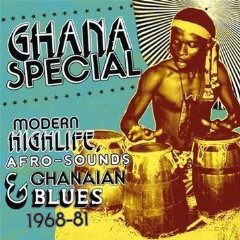Ghana has always had one of the world’s strongest, and most vibrant musical cultures. As a cornerstone of Paul Gilroy’s ‘Black Atlantic’, this West African nation, the first to achieve independence from (British) colonial rule, has also, for several hundred years now, acted as a kind of geographic synthesizer: filtering, multiplying and recombining cultural forms from across Africa, Europe and the Americas. In the twentieth century, with the rise of highlife music – itself a syncretic combination of West African rhythms, Liberian guitar playing, pan-African folk melodies, European brass bands, and later, soul, funk and rock’n’roll – it is no exaggeration to refer to Ghana as a laboratory of future pop music.
Although highlife had already spread from Ghana across West Africa as early as the 1920’s, and had reached something of a ‘golden age’ amidst the utopian spirit of the period immediately following the end of British colonial rule in 1957, the tracks on the new Sound Way Records compilation, Ghana Special, originate from somewhat later – documenting the sound of economic collapse and political instability. The earliest track here represented, ‘Odo Mmera’ by Pa Steele’s African Brothers, a song that anticipates The Smiths in both its wanton melancholy ("I’m lonely and I’m feeling down, if my lover comes to my bed everything will be alright") and its spidery guitar line, was recorded just two years after the CIA-backed military coup that brought the optimistic post-national liberation years to an end.
There followed fifteen years of political instability, involving numerous further coups, strikes, military dictatorships and economic strife (with inflation estimated to be as high as 300% in 1978), until the populist government of Flight Lieutenant Jerry John Rawlings established a nominal stability at the very end of 1981, just a few months after the release of the most recent track on Ghana Special, 1981’s ‘I Go Die For You’ by Kyeremateng Atwede and his Kyeremateng Stars. Indeed, one is almost tempted to compile a kind of grim historiography, mapping tracks against their respective juntas, with the stuttering rhythms and minor keys of ‘Aaya Lolo’ by The Barbecues, and ‘Mi Nsumõõ Bo Dõnn’ by The Big Beats, their fellows in the stable of bandleader King Bruce, as soundtrack to the formation of the Second Republic under Colonel Ignatius Kutu Acheampong; and the formation of the authoritarian Supreme Military Council in 1975 marked by the quickening tension, minimalist blues and dissonant guitar solos of ‘Ohiana Sua Efir’ by Asaase Ase (‘Underground’).
The temptation towards a grievous historicism is, happily, easily resisted by the overwhelming sense of joy and prescience that characterises this selection. Evidently, many of the most exciting and forward-looking developments in American and European pop music from the late 70’s on, were foreshadowed in Ghana. Aside from the obvious appropriations of Wings and Paul Simon, in Dr. K Gyasi and His Noble Kings we can hear the stuttering intensity of middle period Talking Heads, in the Uhuru Dance Band and Basa Basa Soundz (featuring Fela Kuti on sax), the wild polyrhythmic rout of The Slits and Bow Wow Wow, and in The City Boys Band, the loping rhythms and sweet guitar licks of Fleetwood Mac’s ‘Everywhere’. Throughout these thirty-three lovingly compiled tracks, I hear an almost irresistible call to stop writing, get out of my chair and start dancing round the room, all thoughts of the miserable weather and Britain’s even more miserable political situation, slipping blissfully away.


